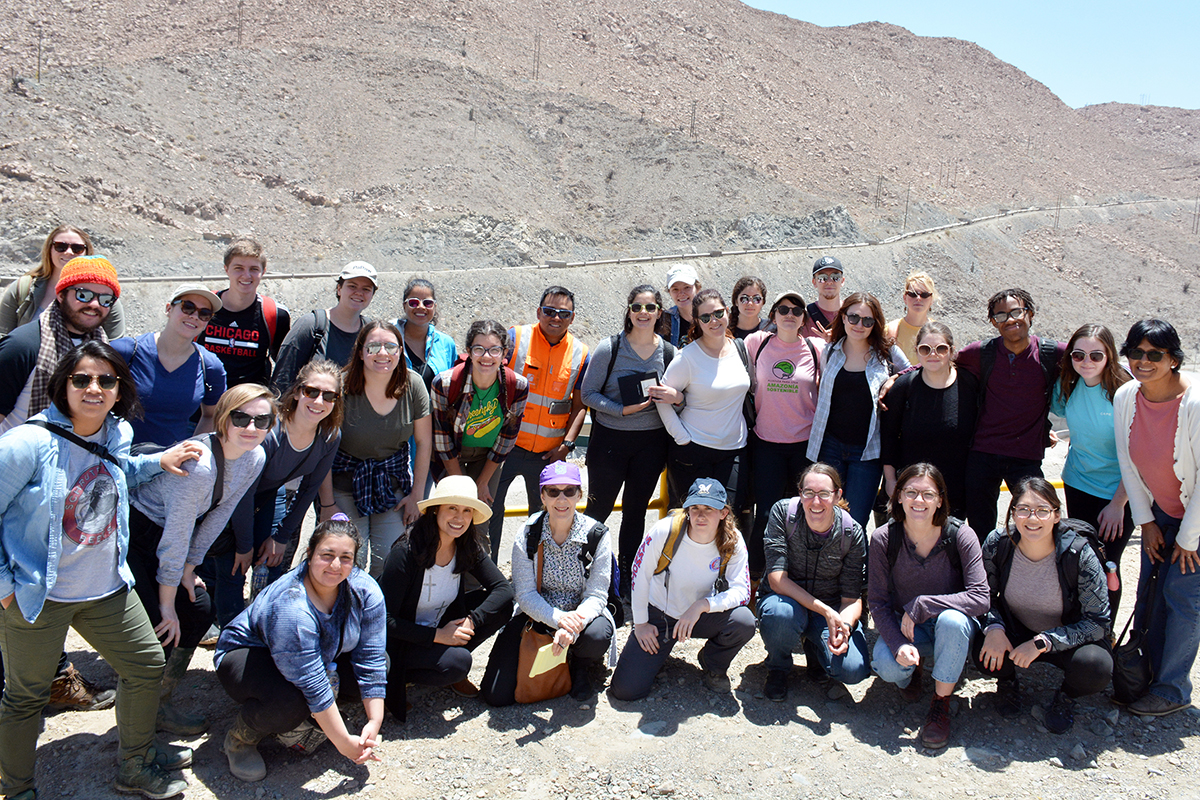 DePaul students and faculty visited the Cerro Verde mine in Peru during a recent winter break study abroad trip that looked at mining and deforestation of the Amazon. (Photo courtesy of Stephanie Prime Eguiluz, Sociedad Cerro Verde)
DePaul students and faculty visited the Cerro Verde mine in Peru during a recent winter break study abroad trip that looked at mining and deforestation of the Amazon. (Photo courtesy of Stephanie Prime Eguiluz, Sociedad Cerro Verde)
“We went in with the sense that mining is doing a lot of damage, and we left with a sense that it's also providing employment, especially in the small-mining sector,” says Rose Spalding, a DePaul political science professor and researcher on mining in Central and South America. “It's hard for people in that sector to find other jobs. Often times they are internal migrants from other parts of Peru because there weren't opportunities where they came from. Some are interested in improving their environmental impact, but they need resources in order to be able to make that transition."
There’s no easy solution to the mining and deforestation issue, notes Christie Klimas, an assistant professor of environmental science and studies.
“Alternatives to deforestation are necessary to preserve this area, but the question becomes, how can we make the forest more valuable intact than cut down while also recognizing that there are a lot of people who work in the mines because it’s one of the lone sources of income in some of these regions,” Klimas says.
Mining is a major driver of deforestation in the Peruvian Amazon, according to Klimas and Spalding. One example they pointed out is mining for alluvial gold, which washes down from the mountains and settles in the soil. Panning for the gold might have been an alternative at one point in history, but now it’s much more efficient to use chemicals like mercury to extract and concentrate microscopic gold particles. The process contaminates nearby water and soil, and encourages continual expansion into new territory. Over 200,000 acres of the Peruvian Amazon have been deforested in this manner because of the high value of gold. In addition to effects from deforestation, bacteria convert the mercury into methyl-mercury, a toxic form that bioaccumulates in fish and creates health problems for local residents whose diet includes fish, they say.
“I believe we have a moral responsibility to preserve nature — the rain forest is still so incredibly unknown — to lose it before fully understanding what we are losing would be a global tragedy,” says Klimas, a researcher on plants and trees of the Amazon.
The two faculty researchers led a group of 26 students on a study abroad trip to Peru during winter break, visiting the cities of Lima, Puerto Maldonado and Arequipa.
“This trip offered students a chance to interview a broad array of Peruvians, including local leaders, scientists, indigenous people, environmentalists, gold and copper miners, farmers, development specialists, and university students,” says Spalding. “Students were able to witness the challenges associated with environmental degradation in the Amazon and the Andean foothills, and learn about the creative solutions being fashioned by innovators and visionaries in Peruvian communities.”
Prior to the trip, the students, who represented a wide swath of majors from across the university, met as a group several times to learn about the country, its culture and politics, and the mining industry and deforestation.
“Global learning is a transformative experience,” says Klimas. “One of my favorite parts of leading study abroad courses is watching students learn from those they encounter on these trips and from each other. I think that travel abroad makes the world seem smaller, and that communicating in another language can build empathy and other soft skills that are important in education and careers. Visiting new cultures can provide new ideas but also allows us to reflect on our culture in a different way."
While in Lima, the country’s capital, the group met with different organizations to discuss the impacts of mining in the country. In Puerto Maldonado, which is located in the Peruvian Amazon, the students spoke with residents in local communities and visited nature preserves, degraded forests, scientific research centers, and informal gold mining sites. Lastly, in Arequipa, Peru’s second largest city, they visited the Cerro Verde mine, a large open pit copper and molybdenum mine.
“I wanted to go on the Peru study abroad trip because it connected my environmental studies curriculum with my study of the Spanish language,” says senior Maddy Robertson, an environmental studies major from Arlington Heights, Illinois. “This trip was the perfect experiential learning opportunity because it allowed me to immerse myself in Peruvian culture and learn about the mining practices from the miners themselves.”
A student poster presentation titled “Mining, Forests and Community in Peru” is set for 1-2:30 p.m. March 8 in Arts & Letters Hall, Room 112 on the Lincoln Park campus. Students who attended the study abroad trip to Peru will share their experiences. Topics include the effect of mining on Indigenous communities and Peru, environmental education, remediation of previously mined sites, ethical consumption and deforestation. The event is open to the DePaul community.